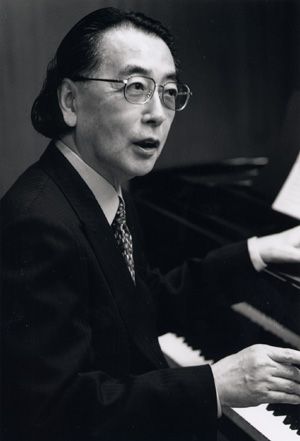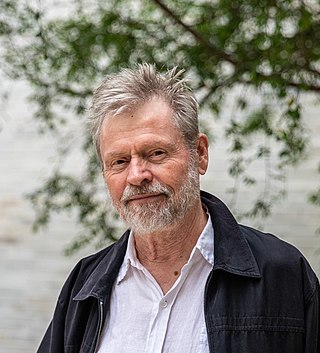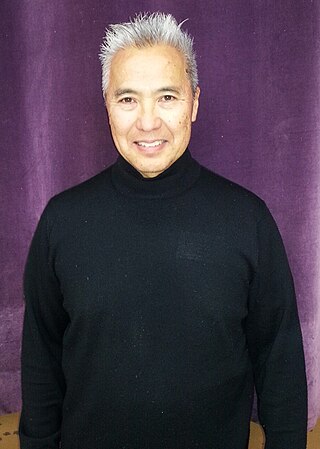Related Research Articles

A shakuhachi is a Japanese longitudinal, end-blown flute that is made of bamboo. The bamboo end-blown flute now known as the shakuhachi was developed in Japan in the 16th century and is called the fuke shakuhachi (普化尺八). A bamboo flute known as the kodai shakuhachi or gagaku shakuhachi (雅楽尺八) was derived from the Chinese xiao in the Nara period and died out in the 10th century. After a long blank period, the hitoyogiri shakuhachi (一節切尺八) appeared in the 15th century, and then in the 16th century, the fuke shakuhachi was developed in Japan. The fuke shakuhachi flourished in the 18th century during the Edo period, and eventually the hitoyogiri shakuhachi also died out. The fuke shakuhachi developed in Japan is longer and thicker than the kodai shakuhachi and has one finger hole less. It is longer and thicker than hitoyogiri shakuhachi and is superior in volume, range, scale and tone quality. Today, since the shakuhachi generally refers only to fuke shakuhachi, the theory that the shakuhachi is an instrument unique to Japan is widely accepted.

The Sydney Symphony Orchestra (SSO) is an Australian symphony orchestra based in Sydney. Initially formed in 1908, the orchestra has performed at the Sydney Opera House as its home concert hall, since the venue's opening in 1973. Simone Young is the orchestra's chief conductor and the first female conductor in the post.

Toshi Ichiyanagi was a Japanese avant-garde composer and pianist. One of the leading composers in Japan during the postwar era, Ichiyanagi worked in a range of genres, composing Western-style operas and orchestral and chamber works, as well as compositions using traditional Japanese instruments. Ichiyanagi is known for incorporating avant-garde techniques into his works, such as chance music, extended technique, and nontraditional scoring. Ichiyanagi was married to artist Yoko Ono from 1956 to 1962.

John Kaizan Neptune is an American player and builder of the shakuhachi. He is known particularly for his use of the instrument in non-traditional contexts, such as jazz and cross-cultural music.
Michiru Oshima is a Japanese composer and arranger. She works on music in wide range of areas, such as anime, films, television series, video games and concerts. She has written scores for over 100 movies, over 200 television titles, video games, various types of events, concerts, theaters, among others. Ōshima is one of the most prolific living composers for film, anime and video game. She has released over 300 CDs including film soundtracks and artist CDs. Her works include composition for Godzilla vs. Megaguirus, Godzilla Against Mechagodzilla, and Godzilla: Tokyo S.O.S. movies and scores for numerous anime television series, including Fullmetal Alchemist, Fullmetal Alchemist the Movie: Conqueror of Shamballa, Nabari no Ou, Queen Emeraldas, Xam'd: Lost Memories, Arc the Lad, and Weathering Continent. In addition to the soundtracks on Kaiju films and anime music, she has composed music for several video games such as Genghis Khan II: Clan of the Gray Wolf for Super NES, Ico for PlayStation 2, Legend of Legaia for PlayStation and its PlayStation 2 sequel Legaia 2: Duel Saga, Arc the Lad III, Deemo, Midnight Play by the company Tivola based on the art illustrations of Květa Pacovská, and an orchestral arrangement of a Zelda medley for the Wii and GameCube game The Legend of Zelda: Twilight Princess. She was also the composer for a Japanese stage musical adaptation of the classic Hollywood film Roman Holiday. Her latest work includes the composition of several music tracks for the highly acclaimed Chinese espionage thriller film The Message and a 2017 Chinese mystery thriller film The Devotion of Suspect X (film).
Carl Edward Vine, is an Australian composer of contemporary classical music.

Tyondai Adaien Braxton is an American composer and musician. He has been composing and performing music under his own name and collaboratively under various group titles and collectives since the mid-1990s, including in the experimental rock group Battles from its formation in 2002 until his departure from the group in 2010.

Ross Edwards is an Australian composer of a wide variety of music including orchestral and chamber music, choral music, children's music, opera and film music. His distinctive sound world reflects his interest in deep ecology and his belief in the need to reconnect music with elemental forces, as well as restore its traditional association with ritual and dance. He also recognises the profound importance of music as an agent of healing. His music, universal in that it is concerned with age-old mysteries surrounding humanity, is at the same time connected to its roots in Australia, whose cultural diversity it celebrates, and from whose natural environment it draws inspiration, especially birdsong and the mysterious patterns and drones of insects. As a composer living and working on the Pacific Rim, he is aware of the exciting potential of this vast region.
Jeff Peterson is an American slack key guitar player from Maui, Hawaii. The son of a paniolo at Haleakala Ranch, Peterson was exposed to the sounds of slack key at an early age.

Dr Thomas Fitzgerald is an Australian composer, musical director, conductor and musician.

The Bamboos are an Australian funk and soul band from Melbourne.
Donald Reid Womack is a composer of contemporary classical music. He was born in Virginia, raised in East Tennessee and studied at Furman University and Northwestern University, receiving degrees in philosophy, music theory, and music composition.
Christopher Yohmei Blasdel is a shakuhachi performer, researcher and writer specializing in the music of Japan and Asia. In 1972, while on foreign study in Tokyo, he was introduced to the Kinko Style shakuhachi master Goro Yamaguchi, whom he studied with until Yamaguchi’s death in 1999. In 1975, Blasdel began learning Aikido under Yasuo Kobayashi and performing with the butoh dancer Akira Kasai at his studio, Tenshikan. Blasdel presently holds a 5th degree black belt in Aikido.
Marshall McGuire is an Australian harpist, teacher, conductor and musical administrator.

Barry Ernest Conyngham,, is an Australian composer and academic. He has over 70 published works and over 30 recordings featuring his compositions, and his works have been premiered or performed in Australia, Japan, North and South America, the United Kingdom and Europe. His output is largely for orchestra, ensemble or dramatic forces. He is an Emeritus Professor of both the University of Wollongong and Southern Cross University. He is former Dean of the Faculty of the Fine Arts and Music at the University of Melbourne.

Kenny Endo is an American musician and taiko master. He is the leader of several taiko ensembles and regularly tours, performing traditional and contemporary taiko music. Endo is also the first non-Japanese national to receive a natori in the field of hogaku hayashi, Japanese classical drumming. Today Endo composes his own music and plays taiko professionally as a solo artist, with his ensembles, and in collaboration with other artists.
James Nyoraku Schlefer, born 1956 in Brooklyn, New York, is a performer and teacher and composer of shakuhachi in New York City. He received the Dai-Shi-Han certificate in 2001, one of only a handful of non-Japanese to receive this high-level award. In 2008, he received his second Shi-Han certificate from Mujuan Dojo, in Kyoto. In Japan, Schlefer has worked with Reibo Aoki, Katsuya Yokoyama, Yoshio Kurahashi, Yoshinobu Taniguchi, and Kifu Mitsuhashi. His first teacher was Ronnie Nyogetsu Seldin. He holds a master's degree in Western flute and musicology from Queens College and currently teaches shakuhachi class at Columbia University and music history courses at the City University of New York. He has performed at Carnegie Hall, Lincoln Center, the Kennedy Center, Tanglewood, BAM, the Metropolitan Museum, at colleges and universities throughout the US and has toured in Japan, Indonesia, Brazil and counties in Europe. Schlefer has four solo recordings, Wind Heart(which travelled 120,000,000 miles aboard the Space Station MIR) Solstice Spirit (1998), Flare Up (2002), and In The Moment (2008). His music has been featured on NPR's All Things Considered. Schlefer's latest recording Spring Sounds, Spring Seas was released in June 2012 and features his original music for shakuhachi and orchestra.
The Limelight Awards were an annual celebration of the performances, recordings and music personalities in Australian classical music. Sponsored by the monthly classical arts magazine Limelight, they were the only publicly voted awards of their kind in Australia. In 2012 the awards attracted more than 4,500 votes.
Taikoz is a taiko ensemble based in Sydney, Australia. Formed in 1997, they are credited with not only being an early Australian taiko ensemble, but for also broadly expanding interest in taiko performance in Australian society.
Lachlan Skipworth is an Australian composer based in Perth, Western Australia.
References
- ↑ "Shakuhachi meditation by a waterfall". ABC South East NSW. 18 June 2015. Retrieved 16 December 2017.
- ↑ "Shakuhachi: the sound of bamboo". ABC South East NSW. 19 June 2015. Retrieved 16 December 2017.
- ↑ Taylor, Andrew (14 September 2012). "Near-death accident transforms musician". The Sydney Morning Herald. Retrieved 16 December 2017.
- ↑ "Drumming up a collaboration". NewsComAu. Retrieved 16 December 2017.
- ↑ "Japanese drums tap spiritual music". 26 August 2012. Retrieved 16 December 2017.
- ↑ Aronson, Emily. "Grand master guides novices in Japanese musical tradition." https://www.princeton.edu/main/news/archive/S24/28/47Q36/index.xml?section=featured. Retrieved 22 May 2016.
- ↑ "Breathing creatively". Radio National. 16 February 2015. Retrieved 16 December 2017.
- ↑ "Winners - Classical Music Awards". Australasian Performing Right Association (APRA). Retrieved 28 April 2010.
- ↑ ARIA Award previous winners. "ARIA Awards – Winners by Award – Best World Music Album". Australian Recording Industry Association (ARIA). Retrieved 12 November 2018.